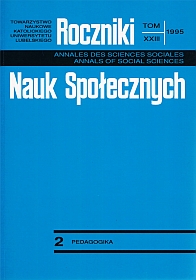Self-discipline as a Method of Effective Formation in the Teaching of Cardinal Stefan Wyszyński
Abstract
According to Cardinal Stefan Wyszyński's teaching a method of effective educative influence is to take up self-disciplining work based on self-cognition, moral evaluation, self-control, transcendence of the person and put into practice the recognized tasks of man towards God, towards oneself, the other, the world and history. Discerning the role and value of self-discipline would point to its various spheres and to its relation with such forms of formation as: physical, mental, moral, ascetic, social, aesthetic or occupational education. He especially devoted much space and attention to various ways of developing self-disciplining activity. At that he pinpointed the value of ideals and patterns activating the process of self-disciplining work which is effective when the subject forms his personality in a mature fashion, regulating one's own behaviour by one's relation to God, neighbour and the surrounding reality. Self-disciplining work was supposed to mold strong, reliable, harmonious and enduring personalities, open to transcendence, moral and religious values. The Primate put forward a self-training programme which was extremely rich in content, ordered and internally coherent.
Copyright (c) 1995 Roczniki Nauk Społecznych

This work is licensed under a Creative Commons Attribution-NonCommercial-NoDerivatives 4.0 International License.


